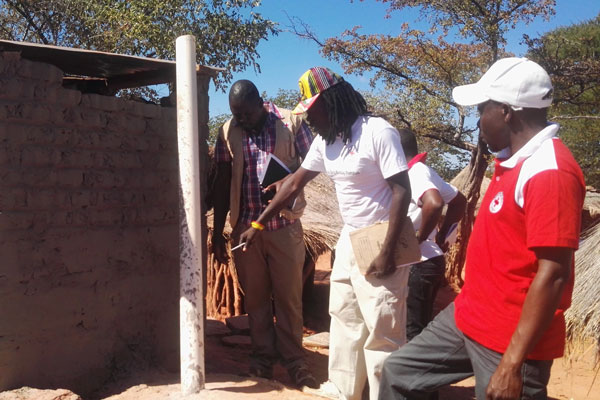
 Fishing is a legendary hazardous occupation, particularly among artisanal fishermen where fatalities have been high over the years. The dangers fishermen face include extreme weather, drowning and animals.
Fishing is a legendary hazardous occupation, particularly among artisanal fishermen where fatalities have been high over the years. The dangers fishermen face include extreme weather, drowning and animals.
By Moses Mugugunyeki recently in Kariba
Compounding the problem in many countries, Zimbabwe included, regulations concerning safety of fishermen are only applied to big companies while artisanal fishermen are sidelined.
The International Labour Organisation (ILO) estimates that each year in Africa, every 15th canoe has accident and that one of 200 200 fishermen dies in a canoe accident among small-scale fishermen.
It is against this background that the Zimbabwe Red Cross Society (ZRCS) under its disaster management and preparedness is helping offset the risks and seasonal fluctuations artisanal fishermen at Musamba and Chalala fishing camps on the shores of Lake Kariba face.
The programme, which is being implemented in partnership with the Danish Red Cross, is being funded by the World Bank under its Global Facility for Disaster Reduction and Recovery as well as the Danish International Development Agency.
“The project aims at enhancing capacity of vulnerable rural communities to prepare for, mitigate and respond to recurrent disasters and the impacts of climate change in Kariba district,” said ZRCS secretary-general Maxwell Phiri.
Phiri said Red Cross was establishing a community early warning system to assist communities, especially fishing camps in the district. He said his organisation had kick started the project at Musamba and Chalala fishing camps in Mola (Ward 3).
- Chamisa under fire over US$120K donation
- Mavhunga puts DeMbare into Chibuku quarterfinals
- Pension funds bet on Cabora Bassa oilfields
- Councils defy govt fire tender directive
Keep Reading
“Part of the programme that we are doing in Kariba includes the establishment of a community early warning system where Red Cross is working with government departments that include Nyaminyami Rural District Council, Meteorological Services Department and the Lake Navigation Control,” he said.
He said the project would go a long way in addressing issues such as occupational safety and health as well as social security protection.
Phiri said the programme had seen ZRCS training 16 volunteers on a community early warning system while 30 were trained in community disaster response, contingency planning and basic first aid.
Community disaster response teams were equipped with first aid kits, life jackets with whistles and life buoys. “We also procured an automated weather station which will soon be installed near Bumi Hills to improve local weather forecast accuracy and relevance to local communities,” Phiri said. “One hundred people from the fishing communities are receiving weather forecasts and adverse weather warnings through messages on mobile phones. These messages are issued by the Lack Navigation Control and based on daily inputs from the Meteorological Services Department.”
Fanuel Maridzanyere, who has been staying at Musamba Fishing Camp for 10 years, said the intervention by ZRCS had reduced deaths.
“Fishermen are frequently exposed to unpredictable dangerous conditions. However, we have seen a reduction of fatalities due to training programmes and awareness campaigns that Red Cross is facilitating,” said Maridzanyere who leads the community disaster response team at the camp.
“Our biggest challenge was the weather. Many a time, fishermen would go into the lake not knowing how the weather would be like, resulting in their canoes capsizing due to heavy winds. We now receive frequent weather alerts and this is helping a lot.”
Maridzanyere, who has basic training in aquatic safety, risk management and aquatic rescue, said a large chunk of fishermen lacked such knowledge.
“I am previledged because I did aquatic rescue training, but most of my colleagues lack that. It becomes a challenge when one is involved in a canoe accident and they cannot swim to safety,” he said.
“While Red Cross has trained us in first aid, we feel there is a need to train some colleagues on aquatic safety. We also need a diver and equipment for rescue operations.” Another resident at the fishing camp, which is home to 400 families, said apart from aquatic tragedies, they were prone to waterborne diseases.
“We did not have toilets and hygiene was not part of this community,” said Penitah Makanuka, who has been at the camp since 2008.
“Open defecation was the order the day and we had no source of safe water. Diseases such as typhoid, cholera and dysentery were common because we never practiced safe hygiene. The coming in of Red Cross in this area is helping a lot.”
ZRCS is building 423 latrines, including 28 communal toilets as well as upgrading 12 community wells in Mola, including at the two fishing camps – Musamba and Chalala. “We are excited that Red Cross helped us with the toilets at the fishing camp. We have also received training and we hold awareness campaigns on water, sanitation and hygiene,” Makanuka said.
The ZRCS project which is being bankrolled to the tune of $857 300 is part of the organisation’s goal of mainstreaming disaster risk reduction and climate change adaptation.










